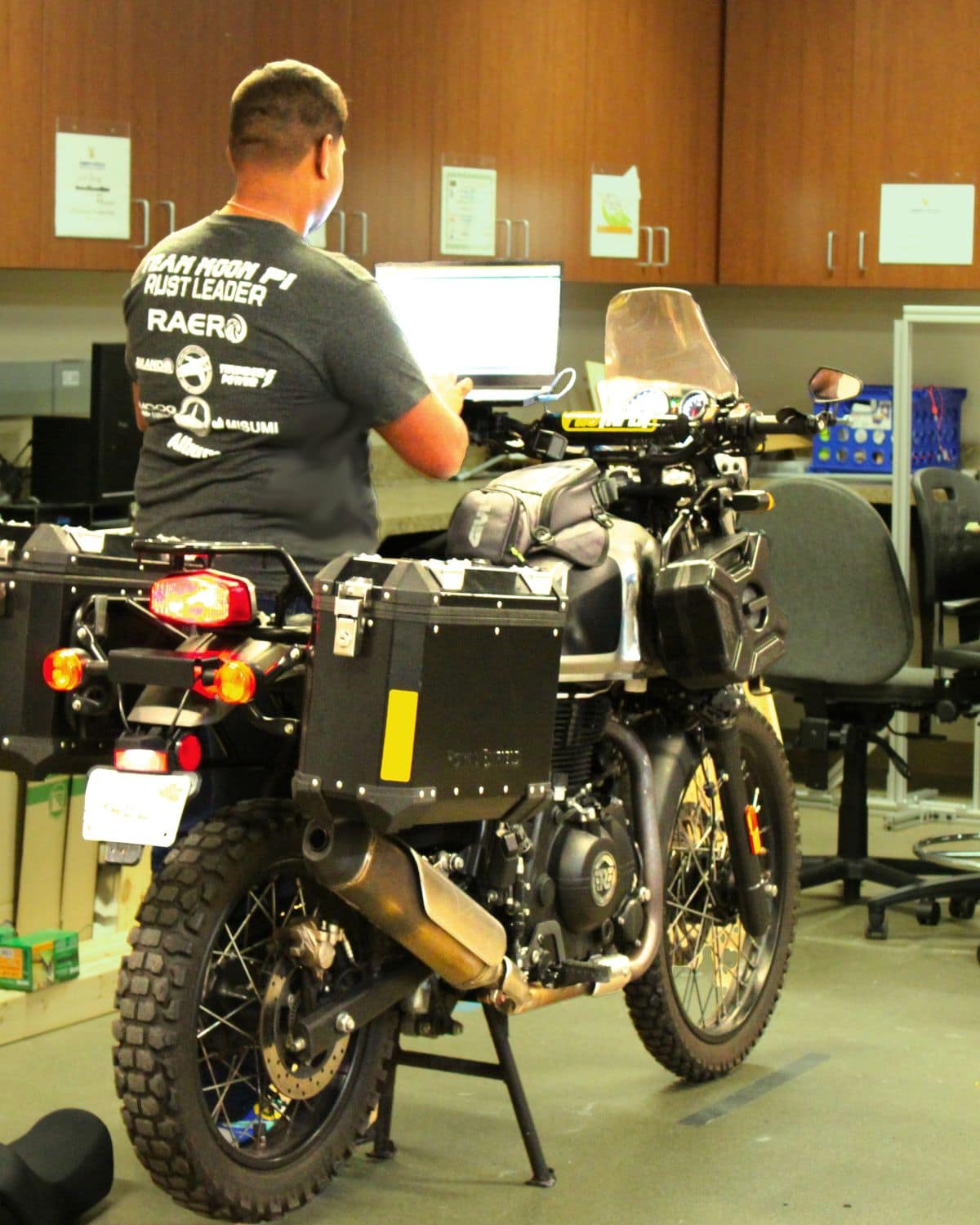

Mechanical Engineering Student Taps Into Club Support for Motorcycle Safety Project

Growing up in the bustling city of Mumbai, India, Mechanical Engineering major Arjun Menon (’26) got hooked on “motorcycle culture” early and began working on them when he was still a young boy. His initial fascination with internal combustion engines has grown into a passion for making motorcycles safer, particularly bikes with high horsepower or those used for adventure tours.
Taking advantage of the unique research opportunities available to undergraduates at Embry-Riddle Aeronautical University, Arjun is now working on a project called Motorcycle Traction Control, and he is getting help from fellow members and faculty advisors who are part of the American Society of Mechanical Engineers club on campus.
We sat down with Arjun to discuss his Embry-Riddle journey, his current passion project and the benefits of joining a student club such as ASME.
Why Did You Choose Embry-Riddle for Your Mechanical Engineering Degree?
I believe the future is going to be autonomous, and Embry-Riddle offers a specialization in robotics, focusing on unmanned systems, which perfectly aligns with my interest in autonomous technology.
The M Building (Engineering Special Projects and Labs) on the Daytona Beach Campus provides all the necessary tools and resources for creating autonomous systems. Students have made autonomous cars, planes, trucks and even chess boards and lawnmowers.
The opportunity to work on diverse autonomous projects convinced me that Embry-Riddle was the ideal place to pursue my degree and work at the forefront of the autonomous revolution.

Working inside one of Embry-Riddle’s leading-edge labs, Arjun Menon researches his traction control device. (Photo: Arjun Menon)
Tell Us About Your Motorcycle Traction Control Research
The traction control project offers significant benefits to motorcycles. By integrating a MATLAB simulator, I can create the perfect power outputs to improve safety and bike performance in challenging scenarios.
The project's simulator considers crucial factors such as front and rear wheel speeds, lean angle, rider and pillion weights and speed. This information enables the system to deliver appropriate power outputs, effectively preventing wheel overspin and skidding accidents.
Additionally, the traction control system excels in the difficult terrain encountered by adventure tourer bikes, such as rocky or sandy roads. By utilizing sensors and power impulses to the rear wheel, the system ensures optimal traction and prevents slippage, even on adverse surfaces.
This capability becomes particularly critical for motorcycles with power outputs exceeding 180hp, as it mitigates the potential safety hazards.
Traction control also presents several other advantages, such as allowing manufacturers to enhance the safety features of their motorcycles and make them more appealing to safety-conscious riders, while the inclusion of a reliable and effective traction control system aligns with current demand for advanced rider aids and cutting-edge technology.
What Benefits Does Joining a Club Like ASME Offer for Students?
The ASME club serves as a hub for projects focused on automobiles, robotics, biomedical devices and energy systems. With a history spanning over 140 years, ASME is more than just a school club; it is an esteemed organization founded by mechanical engineers.
ASME is the perfect mix between an SGA-run club and a fraternity house for any student from the College of Engineering.
By becoming a member, students gain access to hands-on project experiences, allowing them to develop academic and professional skills by applying theoretical knowledge to practical situations. Moreover, the club provides ample networking opportunities, connecting students with like-minded individuals who share a passion for engineering and innovation.
The ASME club also boasts renowned advisors, such as Dr. Birce Dikici and Dr. Christine Walck, who offer guidance and mentorship to students. Their wealth of experience in research enhances the quality of projects and supports students in overcoming challenges.
Participating in ASME's social events helps students expand their professional networks, develop interpersonal skills and establish valuable connections. Additionally, ASME's presence at campus career fairs demonstrates its appeal to employers, making it a valuable addition to any student's development.
What is Your Career Goal and How Will Embry-Riddle Help You Achieve It?
My goal is to launch my own startup focused on developing smart devices for automobile intelligence and IoT. I want to create innovative dashboards, displays and connected technologies that enhance user interaction with their cars and bikes.
At Embry-Riddle, our labs are equipped with an extensive range of research and development equipment, which has enabled me to explore and create the circuits, devices and structures necessary for my startup.
The most important part of the Embry-Riddle experience is an environment conducive to innovation and collaboration. The professors and clubmates I have interacted with have been incredibly supportive, offering guidance and assistance whenever I encountered challenges.
Joining the ASME club has been a particularly valuable experience, as it has provided me with a network of like-minded individuals who share my passion for technology and entrepreneurship.
In addition to this, the David B. O’Maley College of Business has the Center of Innovation and Entrepreneurship, which helps provide you with every suitable approach to establishing your own brand.

